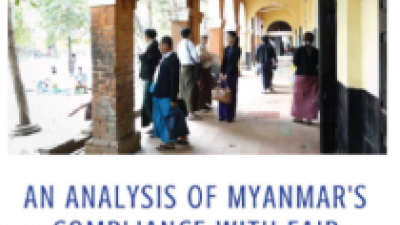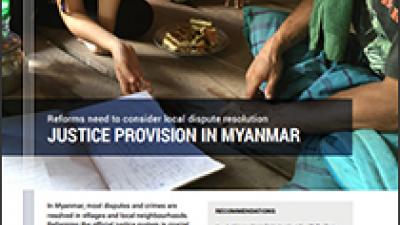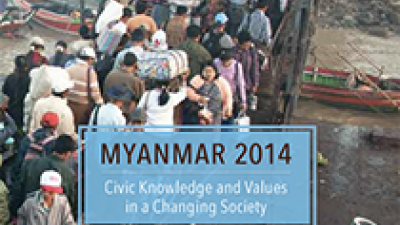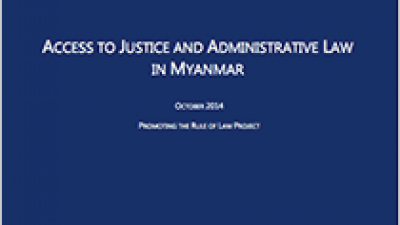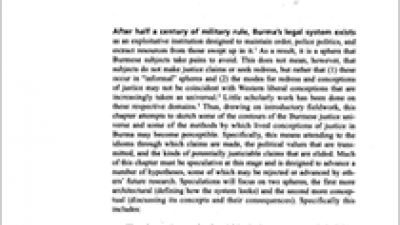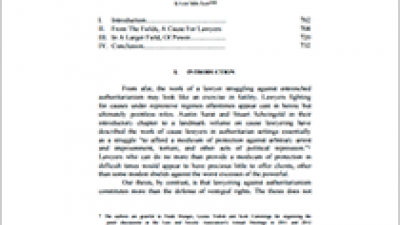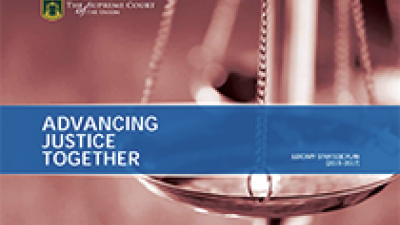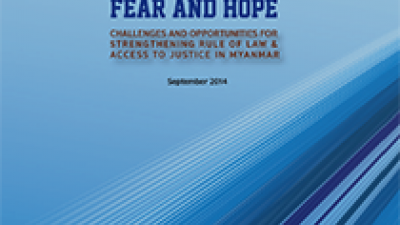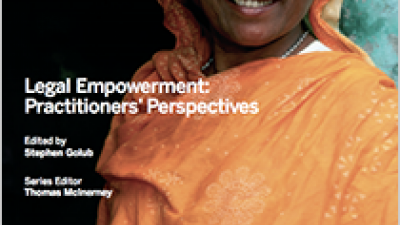-
This October 2017 report from Justice Base details observers’ findings from Yangon Region’s Township and District Courts from 12 June 2013 to 30 April 2014 and 11 January 2015 to 28 December 2016.
-
This March 2017 policy brief shares findings from recent research by the EverJust project, which is a collaboration between EMReF, Yangon University, the Danish Institute for International Studies,...
DIIS Policy Brief: Justice Provision in Myanmar
This March 2017 policy brief shares findings from recent research by the EverJust project, which is a collaboration between EMReF, Yangon University, the Danish Institute for International Studies, and Aarhus University.
-
This 2014 survey report by The Asia Foundation (TAF) provides a broad sense of public knowledge and opinion across Myanmar from over 3,000 participants in all 14 States and Regions. The survey covers...
The Asia Foundation Civic Knowledge and Values in a Changing Society
This 2014 survey report by The Asia Foundation (TAF) provides a broad sense of public knowledge and opinion across Myanmar from over 3,000 participants in all 14 States and Regions. The survey covers topics like knowledge of government, political participation and understanding, identity, gender, the peace process, public outlook, and sources of information.
-
This October 2014 paper by Melissa Crouch (sponsored by the Promoting Rule of Law Project) examines the importance of administrative law in Myanmar in promoting good governance, accountability, and...
Access to Justice and Administrative Law in Myanmar
This October 2014 paper by Melissa Crouch (sponsored by the Promoting Rule of Law Project) examines the importance of administrative law in Myanmar in promoting good governance, accountability, and checks on executive power.
-
This article by Elliott Prasse-Freeman in Myanmar: The Dynamics of an Evolving Polity (2015) draws on interviews with lawyers and legal aid professionals in Yangon to map the informal mechanisms...
Conceptions of Justice and Rule of Law in Burma
This article by Elliott Prasse-Freeman in Myanmar: The Dynamics of an Evolving Polity (2015) draws on interviews with lawyers and legal aid professionals in Yangon to map the informal mechanisms through which Myanmar people seek out their versions of justice.
-
This 2014 article published in the Wisconsin International Law Journal argues that Myanmar lawyers should take up advocacy for the law itself as a cause and a long-term, systemically oriented view of...
Not Just Defending; Advocating for Law in Myanmar (Nick Cheesman and Kyaw Min San)
This 2014 article published in the Wisconsin International Law Journal argues that Myanmar lawyers should take up advocacy for the law itself as a cause and a long-term, systemically oriented view of their efforts as activists.
-
In December 2014, the Supreme Court of the Union published a three-year strategic plan for the judiciary. It includes five key performance areas: 1) Protect Public Access; 2) Promote Public Awareness...
Advancing Justice Together: Judiciary Strategic Plan 2015 – 2017
In December 2014, the Supreme Court of the Union published a three-year strategic plan for the judiciary. It includes five key performance areas: 1) Protect Public Access; 2) Promote Public Awareness; 3) Enhance Judicial Independence and Accountability; 4) Ensure Equality, Fairness, and Integrity of the Judiciary; and 5) Strengthen Efficiency and Timeliness of Case Processing. Year by year plans and reports on their implementation are available on the Supreme Court’s website.
-
Between Fear and Hope: Challenges and Opportunities for Strengthening the Rule of Law and Access to Justice in Myanmar
This September 2014 report by the Myanmar Legal Aid Network (MLAW) draws on in-depth qualitative research in Yangon Region and Mon State, identifying four priority justice concerns from respondents.
-
This May 2016 handbook by the International Commission of Jurists provides a legal analysis of the writ of habeas corpus in international law and within Myanmar’s legal framework, and concludes with...
ICJ: Handbook on Habeas Corpus in Myanmar
This May 2016 handbook by the International Commission of Jurists provides a legal analysis of the writ of habeas corpus in international law and within Myanmar’s legal framework, and concludes with recommendations for the ongoing reform process.
-
This 2010 publication from the International Development Law Organization is a rich compilation of detailed case studies on legal empowerment around the world. Topics range from land rights to...
IDLO: Legal Empowerment, Practitioners’ Perspectives
This 2010 publication from the International Development Law Organization is a rich compilation of detailed case studies on legal empowerment around the world. Topics range from land rights to livelihoods to discrimination.
